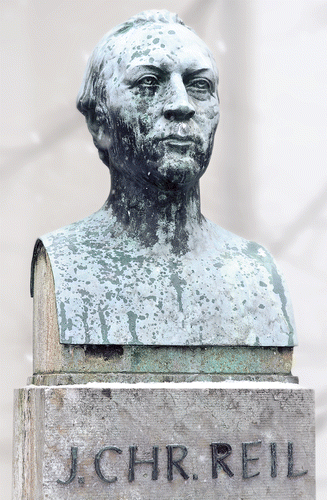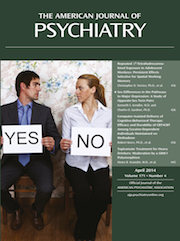Johann Christian Reil (1759–1813): Pioneer of Psychiatry, City Physician, and Advocate of Public Medical Care

Johann Christian Reil is often mentioned in the same breath as psychiatrists such as Philippe Pinel or Jean Etienne Dominique Esquirol. Like Pinel, who effected a fundamental reform of “insane asylums,” demonstrated completely new ways of treating mentally ill patients, and with his student Esquirol, founded the French psychiatric tradition, Reil can likewise be counted as a pioneer of psychiatry. Thus, Reil spoke of “madmen” as sick people who required medical care, vehemently advocated the introduction of public insane asylums as well as the humane treatment of the “mentally ill,” and coined the word Psychiaterie (psychiatry). This picture of Reil as the founder of psychiatry was created shortly after his death. The first eminent professor of “psychiatric therapy,” Johann Christian August Heinroth (1773–1843), described Reil as “the father of psychological medicine proper.” The emphasis on his contributions to psychiatry continued well into the 20th century and dominated his reputation. This view of Reil nevertheless left large portions of his impact as a university professor in Halle and as city physician unrecognized. Last year was the 200th anniversary of his death.
Johann Christian Reil was born on Feb. 20, 1759, in Rhaude, in East Frisia, Germany. He started his medical education in Göttingen in 1779 and continued in Halle in 1880. In 1782 he qualified as a doctor and surgeon after completing his thesis, Tractatus de polycholia. After receiving his medical degree in 1782, Reil obtained his medical license in Berlin, allowing him to practice in Prussia. He completed his practical year under Marc Herz at the Jüdisches Krankenhaus (Jewish Hospital) in Berlin. In 1787 he returned to Halle and became adjunct professor of medicine before replacing his supervisor, Johann Friedrich Gottlieb Goldhagen, 1 year later. At this point he became a full professor of therapy and simultaneously took over management of the clinical center in Glaucha, the former hospital of the Francke Foundations. In 1798 Reil was appointed city physician, and so along with his university obligations, he was responsible for management of the City of Halle Hospital. As city physician, Reil had medicine made at the city pharmacy and looked after every patient in the hospital and the infirmary, as well as in the Zuchthaus (work house).
In 1803 he published his Rhapsodieen über die Anwendung der psychischen Curmethode auf Geisteszerrüttungen (Rhapsodies About Applying the Methods of Treatment to Disorganized Spirits). It included poems, songs, and prose, in which Reil called for the establishment of public asylums. The texts delineate a picture of contemporary German psychiatry in this era. Reil investigated the term “psychotherapy” and took as a starting point the extremely modern, as he called it, “physical cure method.” In the essay “Über den Begriff der Medicin und ihre Verzweigungen, besonders in Beziehung auf die Berichtigung der Topik der Psychiaterie” (“On the Term of Medicine and Its Ramifications, Particularly in Relation to the Revision of the Topic of Psychiatry”), written in 1808, Reil introduced the term “psychiatry.” He started with the principle of continuity between psyche and soma, body and soul, and stated, “The human being has a psychological, physical/chemical and mechanical receptivity; this being reliable, but no more.” Furthermore, he was deeply convinced by the principle of the inseparability of psychiatry from general medicine: “There is, as it were, no psychological medicine, rather a psychiatry; a surgeon, but no surgical medicine.” Following this he described an autonomous theory of psychiatry that took a broad notion of psychiatry as its basis. His comprehensive approach understands psychiatry, psychosomatics, and medical psychology as one entity and as a part of general medicine.
While city physician of Halle, Reil ran a private medical practice in his house at 36 Grosse Ulrichstrasse. The house also served as a place to hold lectures. Among his patients were Johann Wolfgang Goethe, who had already been treated by Reil in 1805, and Wilhelm Grimm, who spent several months in Halle. Moreover, Reil became involved in the founding of a spa, which opened in 1809 in Halle. Reil died of typhus in 1813.



